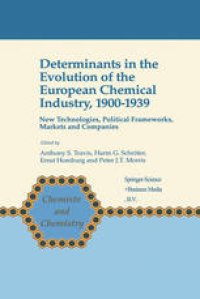
Ebook: Determinants in the Evolution of the European Chemical Industry, 1900–1939: New Technologies, Political Frameworks, Markets and Companies
Author: Anthony S. Travis (auth.) Anthony S. Travis Harm G. Schröter Ernst Homburg Peter J. T. Morris (eds.)
- Tags: Chemistry/Food Science general, Methodology and the History of Economic Thought
- Series: Chemists and Chemistry 16
- Year: 1998
- Publisher: Springer Netherlands
- Edition: 1
- Language: English
- pdf
The editors wish to thank the European Science Foundation for its support of the programme on the Evolution of Chemistry in Europe, 1789-1939, as well as for sponsoring the publication of this volume. Through the subdivision of this initiative that deals specifically with chemical industry it has been possible for historians of science, technology, business and economics to share often widely differing viewpoints and develop consensus across disciplinary and cultural boundaries. The contents of this volume are based on the third of three workshops that have considered the emergence of the modern European chemical industry prior to 1939, the first held in Liege (1994), the second in Maastricht (1995), and the third in Strasbourg (1996). All contributors and participants are thanked for their participation in often lively and informative debates. The generous hospitality of the European Science Foundation and its staff in Strasbourg is gratefully acknowledged. Introduction Emerging chemical knowledge and the development of chemical industry, and particularly the interaction between them, offer rich fields of study for the historian. This is reflected in the contents of the three workshops dealing with the emergence of chemical industry held under the aegis of the European Science Foundation's Evolution of Chemistry in Europe, 1789-1939, programme. The first workshop focused mainly on science for industry, 1789- 1850, and the second on the two-way traffic between science and industry, 1850-1914. The third workshop, dealing with the period 1900-1939, covers similar issues, but within different, and wider, contexts.
This volume represents the proceedings of the European Science Foundation History of Chemistry in Europe 1789-1939 conference held in Strasbourg in October 1996. Leading scholars investigate the ways in which the chemical industry developed throughout much of Europe prior to, and in some cases during, World War II. Emphasis is placed on fertiliser production, which stimulated research into electrochemical and high pressure processes and polymer chemistry. The main focus is on the interwar period, when political strategies for self-sufficiency dictated that innovations were to be based on the availability of raw materials, and the needs of new user industries. Commercial factors also played an important role, particularly the mergers which led to the formation of companies such as IG Farben and Imperial Chemical Industries (ICI). Nevertheless, smaller and independent companies also produced many new products. While much of the European chemical industry was dependent on coal and coal tar products, there were strong moves towards the foundation of science-based biochemical industries.
This book is unique in its close examination of technologies, particularly chemical engineering and the control of processes, research in industry, and countries that were not mentioned in previous literature. It is enhanced by contributions from specialists in business and engineering history, as well as by historians of chemistry and technology.
Audience: This work will be of great value to historians of chemistry, business, engineering and technology.